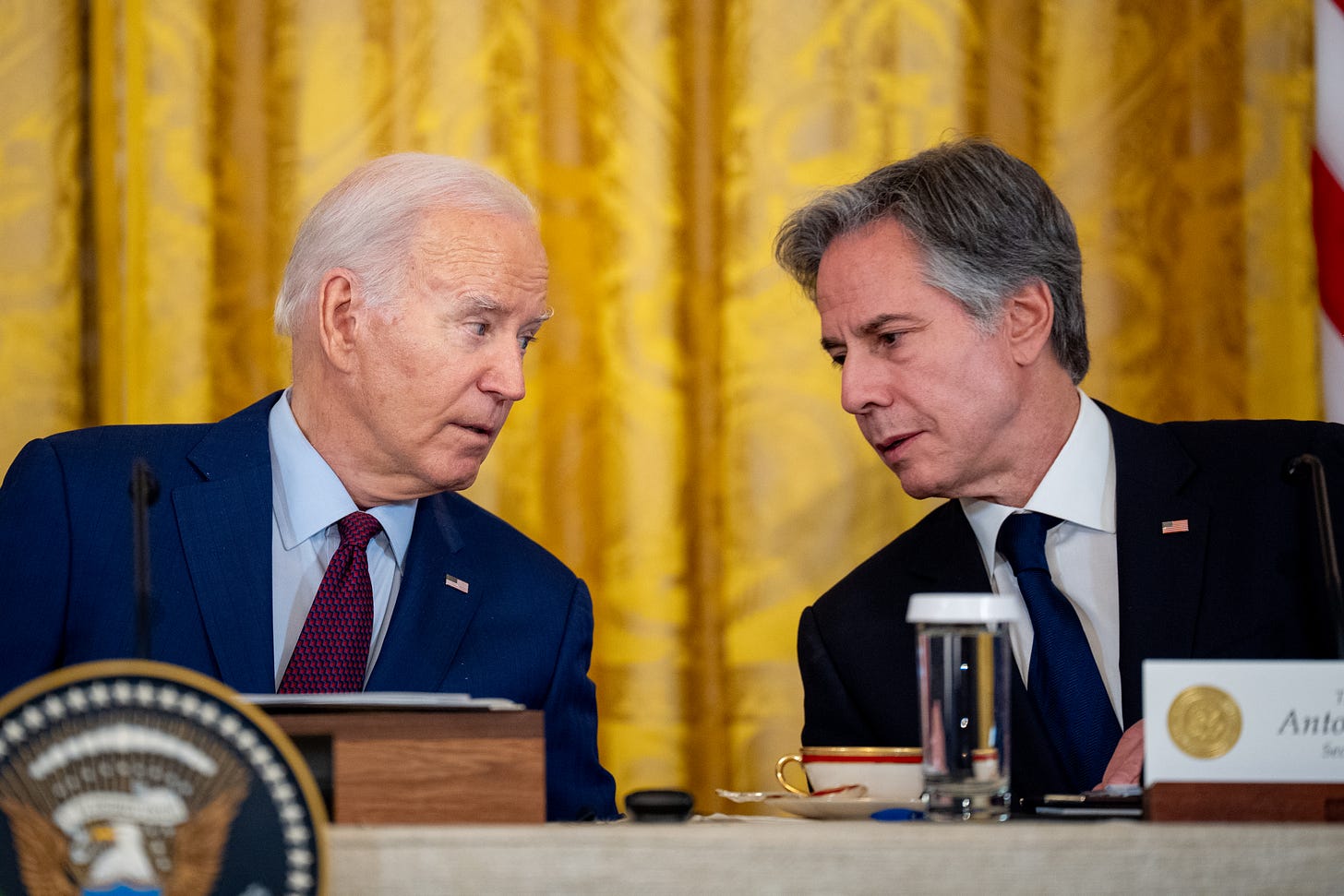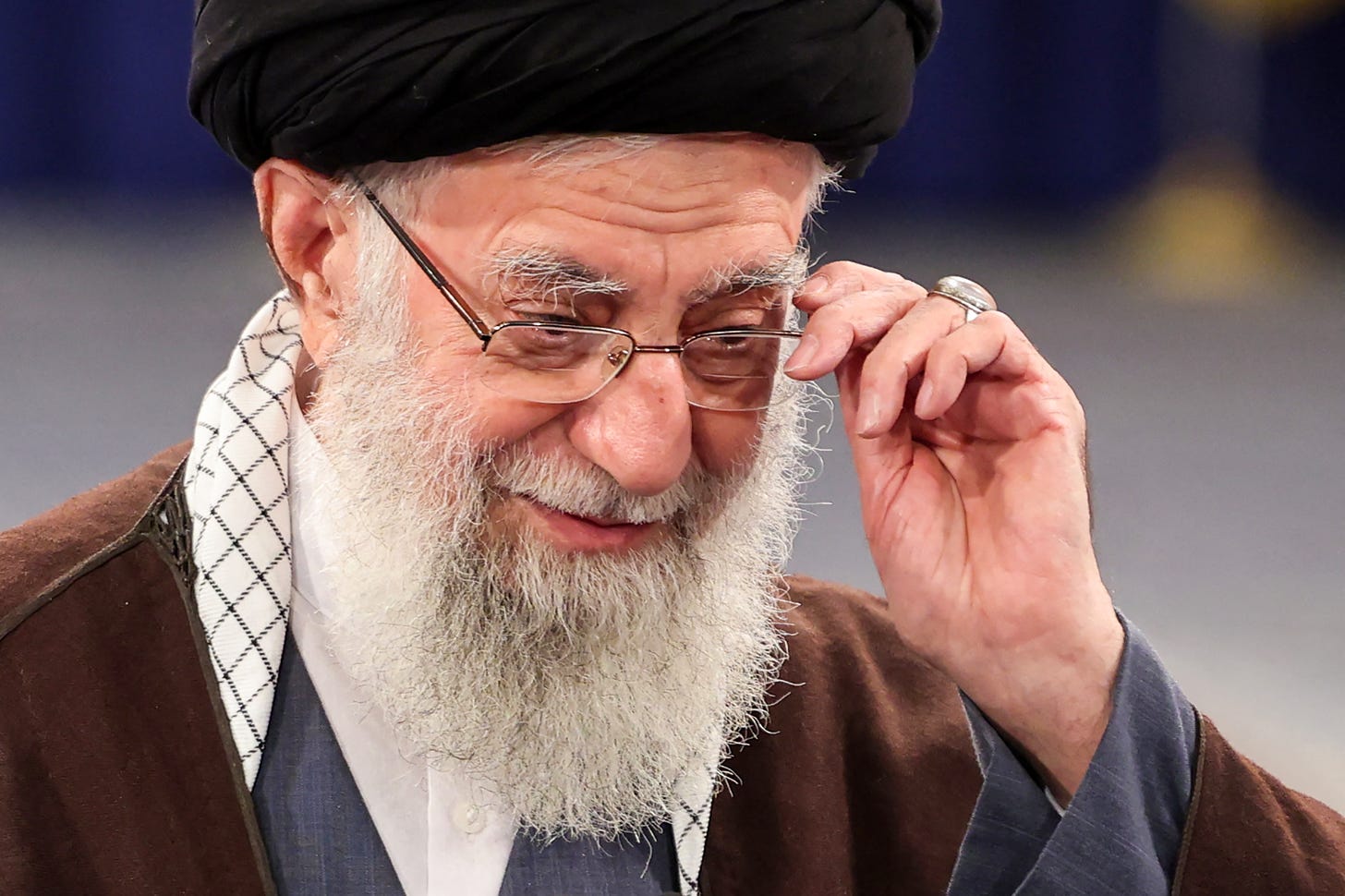The reviews for the much-hyped Humane AI Pin are in and it makes for tough reading for the Californian startup.

CHICAGO — About 300 anti-war activists crowded into the basement of the Teamsters Union’s headquarters on Saturday to hear organizers from all over the country describe their plans to disrupt the Democratic National Convention this August. Joe Biden’s backing of Israel since Hamas’s October 7 attack has turned these left-wing radicals against their own party.
“It’s really inspiring to see that people are just as enthusiastic, and maybe even more enthusiastic, to march on the DNC as they are to march on the RNC,” says Omar Florez, a Milwaukee-based activist. “We can thank Genocide Joe and our movement for that.”
But then a man stumbles to the podium, wiping sweat from his forehead. He grabs the microphone to announce that the Islamic regime of Iran has launched missiles and drones heading straight toward Israel.
“They believe that they will be in Palestinian—I don’t call it Israeli—airspace between two and four a.m., which means about two to four hours from now,” he says. “In addition, there are reports of drones having been fired on Israel from Yemen and Iraq.”
The crowd, all wearing black N95s, erupts into applause. Someone in the back lowers their mask to send a celebratory whistle soaring throughout the room.
The man at the podium, Hatem Abudayyeh, heads the U.S. Palestinian Community Network, “a purported community group which, on information and belief, is an affiliate of the Popular Front for the Liberation of Palestine, a designated terror organization based in Gaza,” according to a lawsuit over the alleged relations between U.S. advocacy groups and Hamas.
“This is when this country and the world needs us because the United States is going to, quote unquote, defend the criminal Israeli state,” says Abudayyeh, whose home was raided by the FBI in 2010 as part of an investigation “concerning the material support of terrorism.”
“We have to assume that the United States is going to try to retaliate against Iran.”
After the boos and calls of “shame” subside, Abudayyeh says it is “incumbent” upon Americans to “stop the United States from expanding this war and hitting Iran.”
“We’ve got to be the strong, powerful anti-war movement that we are,” he says, placing the microphone down and exiting the stage.
The crowd immediately began chanting, “Hands off Iran.”
A woman in a hot pink gas mask, wielding a matching neon cane and dressed in a “Protect Trans Kids” t-shirt, throws her fist in the air. Nearby, a service poodle is taking a nap under the chair of his owner, who is wearing a leather harness over his t-shirt. Then the group that has joined here from cities across America—Seattle, Washington, D.C., Los Angeles—cheers and claps in celebration.
Joe Iosbaker, an organizer with the Freedom Road Socialist Organization, which called October 7 a “good turn of events” in its press release about the terrorist attacks, tells me he supports Iran. His organization has since released a statement backing Iran, where citizens gathered to shout “Death to America” during their nation’s strike against Israel Saturday night.
“We demand hands off Iran,” the statement says. “The people have power, and we will exercise it in the streets.”
Earlier that day, before news of the attack broke, at a “breakout session” on “the anti-war movement,” Shabbir Rizvi, an organizer with Anti-War Committee Chicago, taught participants how to chant “death to Israel” and “death to America” in Farsi.
“Marg bar Israel,” he chanted, leading a group of about 80 attendees along with him. A man draped in a Soviet flag bearing a gold hammer and sickle clapped his hands.
A man in a full black denim outfit shouted out behind his N95—“Can we get a ‘marg bar America’?”
“We can get a ‘marg bar America,’ ” Rizvi replied.
Then Rizvi raised his hand in the air, leading the crowd like a conductor.
“Marg bar America,” they cheered.
On my way out of the event, I ask a woman smoking a cigarette to fill me in on the latest news regarding Iran’s lobbing of missiles and drones, which were later intercepted with help from forces from France, the U.S., and the UK. Iran said its strike was retaliation for Israel’s hit on the Iranian embassy in Syria earlier this month, which killed two of Tehran’s top commanders, and the matter is “concluded”—unless Israel hits back.
“Iran is part of the resistance,” said the woman, who flew in that morning from New Orleans, where she’s been part of an effort to disrupt Israel-bound shipments in her hometown. “Yemen and Iran and Hezbollah, who are also a militant group in Lebanon, and the Syrian government are all parts of the arc of resistance.”
A smile creeps across her face as she tells me: “They’re part of the arc of resistance because the enemies are Israel and the USA.”
Olivia Reingold is a reporter for The Free Press. To support more of our independent journalism, become a Free Press subscriber today:

JERUSALEM — Historians writing years from now about the Middle East conflagration of 2024 will undoubtedly ask, “When did it all begin?” Some will point to the Bush administration which, demoralized by its inconclusive wars in Afghanistan and Iraq, rejected Israel’s entreaties to take out Iran’s then-inchoate nuclear program in 2008.
Others might cite Israel’s willingness to play by the mullahs’ rules, retaliating against their Hezbollah and Hamas proxies rather than against Iran itself, enabling it to emerge from each round of fighting utterly unscathed.
But the bulk of the blame, fair historians will likely agree, will have to fall on the policies of those in Washington who sought to appease Iran at almost any price and ignore its serial aggressions.
Those policies began in the week after President Barack Obama’s inauguration in January 2009. In one of the forty-fourth president’s first acts of foreign diplomacy, Obama sent an offer of reconciliation to Iran’s Supreme Leader, Ayatollah Ali Khamenei. That June, in his historic Cairo speech, Obama became the first president to refer to Tehran’s regime as the Islamic Republic of Iran—legitimizing the oppressive theocracy—and stood aside while that republic’s thugs beat and shot hundreds of Iranian citizens protesting for their freedom.
Over the next four years, the White House ignored a relentless spate of Iranian aggressions—attacks against U.S. Navy vessels in the Persian Gulf; backing for al-Qaeda and other terrorist groups dedicated to America’s destruction; and barely disguised efforts to undermine pro-Western Middle Eastern governments.
At the same time, Iran supported Syrian dictator Bashar al-Assad’s mass slaughter—often with poison gas—of his own countrymen. Obama had declared Syria’s use of chemical weapons as “a red line” that would have “enormous consequences” on America’s involvement in the war. It didn’t.
In Washington, the administration overlooked an Iranian attempt to assassinate the Saudi and Israeli ambassadors (including me) and ended a federal investigation of a billion-dollar Hezbollah drug and arms trafficking ring in the United States. Most egregiously, Iran constructed secret underground nuclear facilities and developed an intercontinental ballistic missile delivery system that threatened the entire Middle East and much of Europe.
Why would any White House, even one devoted to rebuilding America’s relationship with the Islamic world, seek rapprochement with such a regime?
At the time, there were multiple reasons. First, there was the desire of the United States, tired of Middle Eastern wars and no longer dependent on Arab oil, to withdraw from the region and focus on the Far East. Next, there was the belief that the U.S. had traditionally relied on its Sunni and Israeli allies only to discover that Sunnis perpetrated 9/11 and Israelis defied American policy in the West Bank. The Iranians, stronger, modern, and open to the West—so many American policymakers concluded—offered a better alternative if only their leadership were assuaged. Lastly, and ultimately most decisively, was the Iranian nuclear program, a burgeoning strategic threat that the White House refused to interdict by military means.
The nuclear agreement reached in 2015 between the United States, the United Kingdom, France, China, Russia, Germany, and Iran—euphemistically called the Joint Comprehensive Plan of Action (JCPOA)—had three major objectives: to block Iran’s path to the bomb, ensure that Iran became what Obama called “a responsible regional power,” and, failing that, to kick the “nuclear can” down the road. The first two goals proved illusory.

Rather than block Iran’s path to the bomb, the agreement solidly paved it by allowing Iran to retain most of its nuclear infrastructure and to continue producing ever more advanced centrifuges capable of reducing Iran’s breakout time to mere weeks. The deal put no meaningful restrictions on Iran’s missile delivery systems or its clandestine weapons programs. And even then, the largely cosmetic limitations were set to expire in less than a decade. Well before that time, though, Iran harnessed the deal’s financial and strategic rewards to expand its sphere of influence across Iraq, Syria, and Lebanon. So much for the responsible regional power.
In 2018, President Trump withdrew from the JCPOA, reinstated punishing sanctions on Iran, and retaliated for Iranian attacks against Americans, indicating a different approach to the issue, but that policy proved short-lived. A centerpiece of Joe Biden’s 2019 presidential campaign was his pledge to restore America’s adherence to the JCPOA. No sooner had the Democrats regained the White House than the Iranians began to violate the agreement on a massive scale, gradually achieving military nuclear threshold capacity.
Of the original motivations for the deal—blocking Iran’s path to the bomb and transforming Iran into a peaceful nation—neither remained. All Biden was left with was the ability to kick the can down the road and to uphold Obama’s singular foreign policy achievement.
As the Iranian centrifuges spun, the Biden administration entered into intense negotiations to renew the JCPOA. The talks were headed by Robert Malley, who was evicted from the Obama campaign in 2008 for meeting with Hamas. Under Biden, Malley became America’s special envoy to Iran, but he was recently ousted for mishandling sensitive information. Though the initiative to reinstate the deal eventually failed, the U.S. still provided Iran with at least $10 billion in funds that had been frozen, and reportedly much more than that in quiet sanction relief.
Meanwhile, the Iranian provocations mounted. An ally of Russia, Iran provided thousands of offensive drones and long-range missiles used to kill America’s allies in Ukraine. Since the start of the war against Hamas, Iranian proxies have launched more than 170 attacks against U.S. military bases in Iraq, Syria, and Jordan, and all but blocked international shipping through the strategically crucial Bab al-Mandeb Strait.
Still, the U.S. refrained from retaliating against Iran directly, or even holding it publicly responsible. When, in January, three American soldiers were killed by a drone strike by an Iranian-backed militia, the U.S. struck back at the militia and not at the country—or even the factory—that produced the bomb.
Then, on Sunday, a historic first: Tehran directly attacked Israel from its territory with hundreds of drones and missiles.
Historians will survey this inexplicable record and wonder how the United States not only allowed Iran to repeatedly assault its citizens, soldiers, and allies but consistently rewarded it for doing so. They may well conclude that in a desperate effort to avoid getting dragged into a regional Middle Eastern war, the U.S. might well have precipitated one.
While America’s friends in the Middle East, especially Israel, have every reason to feel grateful for the vital assistance they received in intercepting Iran’s missile and drone onslaught, they might also ask what the U.S. can now do differently to deter Iran from further aggression. Press reports about President Biden’s refusal to support an Israeli counterattack against Iran indicate, sadly, that nothing substantial in the U.S. position has changed. He has reportedly urged Israeli Prime Minister Benjamin Netanyahu to see the coordinated response to the attack as a “win.”
The Iranians, though, will not see things that way. Tehran will see this weekend’s direct attack on Israel as a victory—their own—for their ability to continue threatening Israel and destabilizing the Middle East with impunity. If Israel follows Biden’s advice it will send one message to the ayatollahs: “You can launch another 350 missiles and drones at Israel or try to kill Israelis by other means. Either way, the United States won’t stop you.”
Israel, of course, must respond differently. Our target cannot simply be the Iranian proxies that surround our country and that have waged war on us since October 7, but, as the Saudis call it, “the head of the snake.”
The story of America can end only one of two ways: either it stands up boldly against Iran and joins Israel in deterring it, or Iran emerges from this conflict once again unpunished, undiminished, and ready to inflict yet more devastating damage.
Michael Oren, formerly Israel’s ambassador to the United States, Knesset member, and deputy minister for diplomacy in the Israeli prime minister’s office, is the author of the Substack publication Clarity.
Become a Free Press subscriber today:




